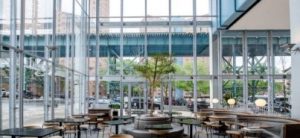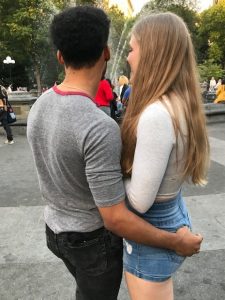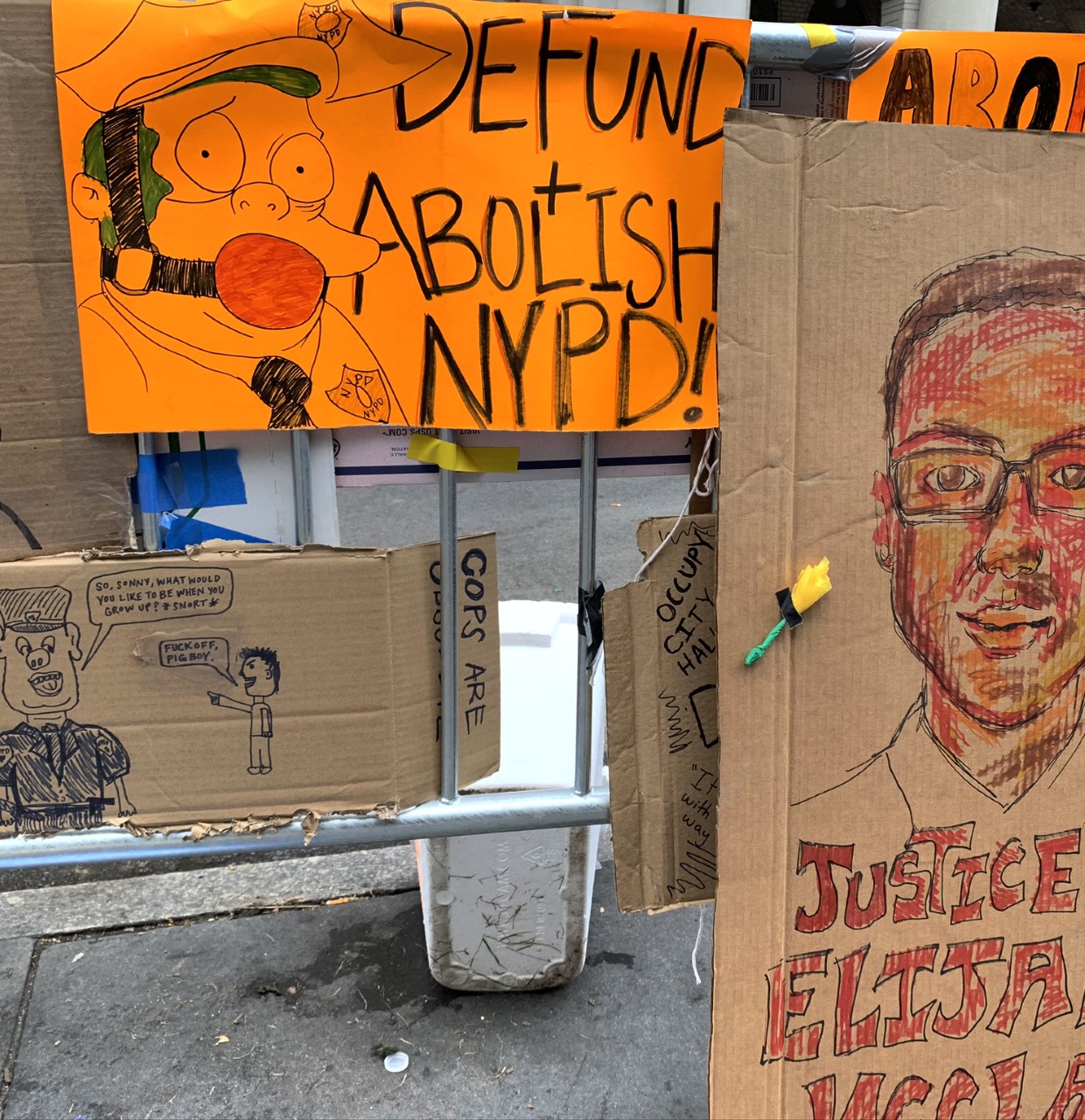My late brother Tom’s second mother (in law) died on Monday in D.R. Teresa Prestinary, of Monte Cristi and New York City, made 105. She had five children of her own but she raised plenty more on both islands. Per her grandson Jamie who told me that on vacays in D.R. he ran into hombre after hombre who thought of her as his own matriarch. I lived up the block from Mama Pres (when she was in New York rather than D.R.) and was often underfoot in her apartment or at my brother’s and sister (in law) Maria’s place across the street. In all that time I never heard Mama Pres say a cross word to anyone ever. The last of 20 children she seems to have been treated as a late gift from God by her family in D.R. So she grew up to grace everyone she met. She had a special connection with my wife (who is the first of 20 children). I can see them now shucking corn on my parents’ porch in the Berkshires, taking the breeze, and laughing together. Maybe they were talking about the odd DeMott fam they’d somehow got mixed up with. Or maybe they were recalling rites they’d performed to ward off witchcraft by Santerian drug-dealers who’d made my wife’s life hell when she opened a $10 clothing store on 140th and Bway back in the ’00s. (The two of them had tested my two year old son’s pee to see if it had prophylactic powers after my wife found chicken blood spattered on her store’s door.)
New York City
Poems from “The City Among Us”
There have been more poems in recent First batches, thanks chiefly to Alison Stone whose work and way in the world has brought other poets to us. That efflorescence, in turn, has made me think I should try harder to bring attention to the poetry of my late friend Robert Douglas Cushman. What follows are poems from his book, “The City Among Us.”
Keystone Melodies
Long ago and far away in San Francisco, that lovely city by the bay, I maneuvered myself into the food concession at the Keystone Korner, a jazz club in North Beach. It was 1975, and I had many strange and wondrous adventures there.
The Way We See (and Hear) Now
“Westside Story 2021.” A yes for me. We watched it through, surprised and moved by crazy young love brought vividly to life in this cast’s Tony and Maria. I kept thinking, no, they have a chance, they’ll get out of the Shakespeare play they were born in, like the street where you were raised and the language that formed you. Valentina will give them bus fare and Anita will not betray them after she is almost gang raped. Justin Peck’s balletic remastering of the Robbins dances. The screenplay by Tony Kushner. The Spanish spoken throughout without subtitles. Spielberg’s camera adds wings to the play, turning it into a movie that’s a play set in the way we see things now. Every story is about the time it’s told in, not the period depicted, and this one is about something’s coming. Gustavo Dudamel conducts the rapturous, jazzy Bernstein score that doesn’t get old. And never will.
Gifts of the Spirit: Robert Farris Thompson on Basquiat and Haring
This Q&A with Robert Farris Thompson was originally posted at the Sotheby’s website in 2020, when the auction house was charged with selling paintings given to Thompson by Jean-Michel Basquiat and Keith Haring.
New York Ghazal
Immigrants, artists, tycoons seek New York.
Bloodstains from aborted dreams streak New York.
To friends from elsewhere, even the name awes.
Their eyes widen when I speak of New York.
Fickle city, we moth-fly toward your light.
You bless the rich, feed on the weak. New York
Toni Cade Bambara’s Memoir: An Excerpt from “Working At It in Five Parts”
Toni Cade Bambara’s “Working At It in Five Parts” is a hidden gem of prismatic self-reflection that we were surprised to find collecting dust in the Spelman College Archives along her voluminous letters, story drafts, teaching lesson plans, and much more.
Tiemann Place to Hyde Park (Rites in Sun and Shadow)
Thanks to Columbia U’s expansion, a chump can now get a chi chi egg/sausage McMuffin for $10 in my hood. That bad deal goes down at Butterfunk Biscuit Co—one of four mini-restaurants in the deeply unfunky “Manhattanville Food Market” located on the first floor of a building in CU’s sterile new STEM complex just above 125th St. Don’t this…

make you want to go home to a Pre-Columbian West Harlem?
After the Fall
First’s original editors, longtime New Yorkers, were fully alive to experiences of love and death on 9/11. We printed a set of responses to the attacks that implicitly contradicted those who assumed “anti-Americanism is a necessity” (without imposing a patriotic litmus test). Our post-9/11 issue featured red, white and blue colors above the fold, though that wasn’t a simple flag-waving gesture. The exemplary citizens (and New Yorkers) invoked on our cover were Latin Americans and an Afro-American: La Lupe, Eddie Palmieri and Jay-Z.
I’m reminded of how our colors seemed out of time to the all-knowing Left when I listen to commentary by pundits like Mehdi Hasan who link the post-9/11 “War on Terror” with l/6. That tendentious timeline all but erases the threat once posed by radical Islamists. It assumes American Islamophobia/xenophobia was always a scarier thing than Islamofascism. (I wonder if Mehdi Hasan noticed what happened to Samuel Paty—the French middle school teacher who was decapitated last October after he dared to teach his students about the Charlie Hebdo murders.) While it’s probably true the threat to Americans and Europeans from Islamist terrorists has diminished in recent years, that’s due largely to those Kurdish fighters who turned the tide against ISIS at the battle of Kobani. Future historians may come to see the Kurds’ victory there in January 2015 as the true culmination of the war that blew up in America on 9/11. The Kurds certainly grasped the meaning of their victory: “The battle for Kobani was not only a fight between the YPG and Daesh [ISIS], it was a battle between humanity and barbarity, a battle between freedom and tyranny, it was a battle between all human values and the enemies of humanity.” The clarity of these (mainly Muslim) soldiers who beat an international army of Islamists underscores the not-knowingness of Mehdi Hasan et al.
The following set of posts—by Donna Gaines, George Held, Hans Koning, Wendy Oxenhorn, Fredric Smoler, Laurie Stone, Kurt Vonnegut, and Peter Lamborn Wilson—mixes pieces from First‘s back pages with writing by authors who published their first thoughts on 9/11 in other places. B.D.
Left of the Left: Sam Dolgoff’s Life and Times
What follows here—after this introduction—are excerpts from Left of the Left, Anatole Dolgoff’s memoir of his father, Sam, who was a large figure on the margins of American life in the last century. Dolgoff embodied an ideal once celebrated on the American left. He was…
a worker-intellectual—someone who toils with his hands all his life and meanwhile develops his mind and deepens his knowledge and contributes mightily to progress and decency in the society around him.
Nocturne for Washington Square

As a resident of Greenwich Village, my local park is Washington Square. I can’t account for what goes on there late at night. According to the media, there’s a riot going on after dark, with bottles being thrown at cops, brawls and even stabbings. There are those in the neighborhood who want to see a curfew in the park, as well as a skateboard ban and restrictions on how many people can be there. These Good Citizens are aiming at the one source of disturbance they can control: the young. But the atmosphere of frantic abandon is too widespread in the city to be controlled. Many people have emerged from lockdown with intense pent-up feelings, and challenges to the police make law enforcement a tricky task. Last week, a deranged man smashed the windows of my favorite diner and decked the 73-year-old cook. Hundreds of dirt bikes have roared up the avenue under my window at 1 a.m. Bursts of impromptu fireworks pierce the slats of my blinds, and I often hear cries of unleashed rage. In the wee hours, I don’t go out wearing flowers in my hair.
There’s a racial subtext to this issue, since the crowd in the Square includes many people of color, and they bring the culture of their neighborhoods, including music. Race and class have always been the flashpoint of disputes over urban turf, but in the streets of Greenwich Village the rules are lightly applied, even if the mixing doesn’t extend to the high-rent apartments. It’s no surprise that Washington Square is now a site of that diversity, since it has a storied history of free expression. The mood may be hard-edged after midnight, but at twilight, when the sunset is golden in the windows of innumerable buildings, it’s mellow yellow. I have seen no violence, but lots of casual toking and flirting—yes, there is plenty of cruising among people of all races, genders, sexualities, and hair colors that defy the human genome.
Trump-Cheap: Three-Dimensional Chess with the Don
A 1997 column by the late Jim Dwyer (who died on October 8th) about a Trump trip to the Bronx.
A Life in Struggle: Felicitas Magdaleno R.I.P.
It is with deep sadness and pain in our hearts that Movement for Justice in El Barrio mourns the passing of our beloved long-time member leader, Felicitas Magdaleno.
First Day Out (A Blue Sky Day Turns Grey)
Like a lot of New Yorkers, I’m missing the outside.
Sociology of Coronavirus by the Sea
It’s a sociologist’s brilliant, brutal dream to witness societal shifts of this magnitude; we see the good, the bad and the ugly, unfiltered.

